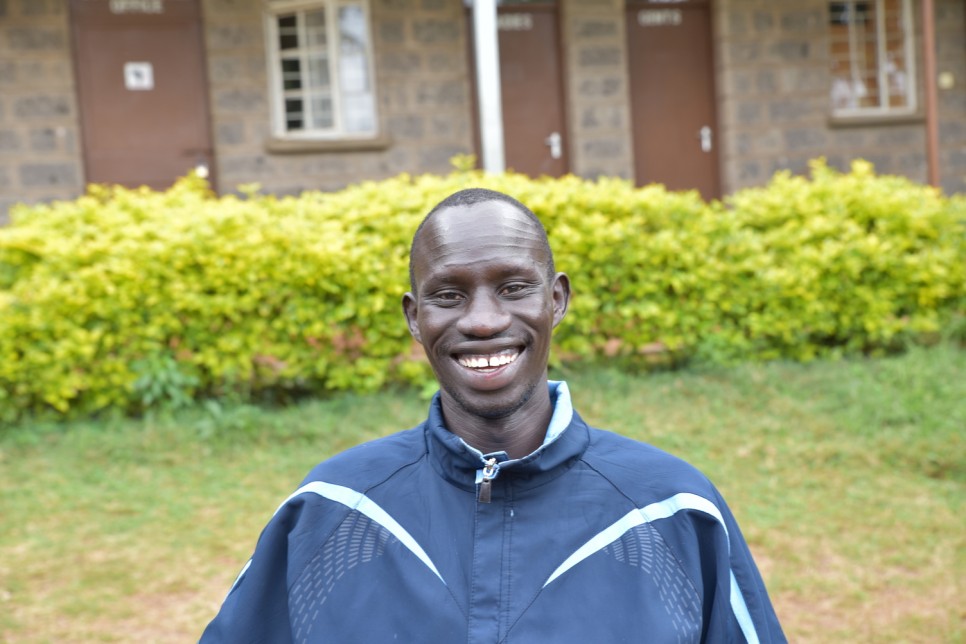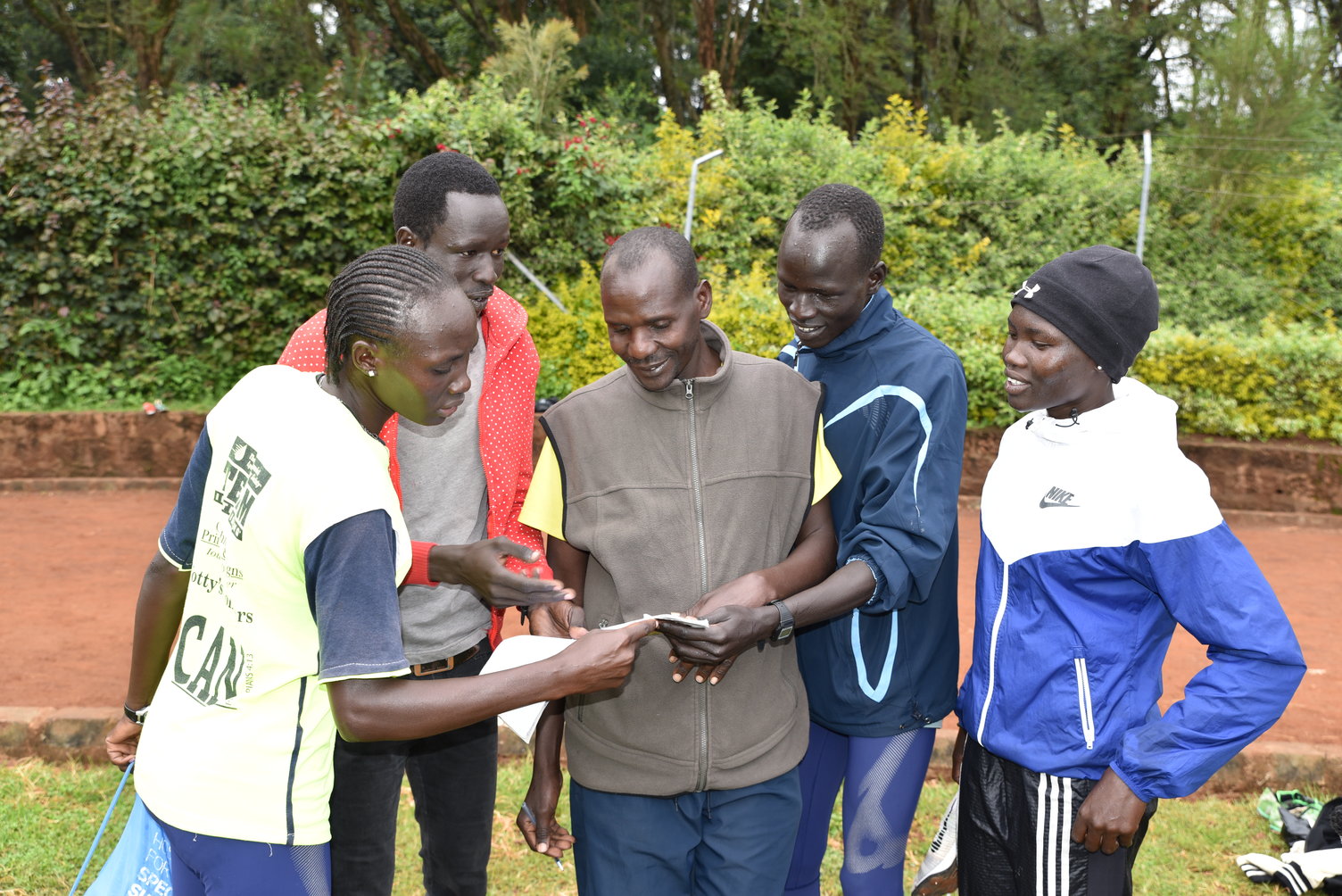Five Refugees from Kenya Camps make the Refugee Olympics Team
For the first time, a team of refugee athletes will compete under the Olympic flag.
UNHCR Kenya in partnership with the Tegla Loroupe Peace Foundation have in the past year identified, mentored and trained talented athletes from refugee camps in Kenya. This has culminated into the selection of five athletes to be part of the refugee Olympics team. The Tegla Loroupe Peace Foundation is founded by Tegla Chepkite Loroupe, a legendary Kenyan athlete.
The five (5) include; Anjelina Nadai, Paulo Amotun, Yiech Pur, James Nyang and Rose Nathike.
Anjelina Nadai Lohalith, 21, South Sudan, 1,500 metres
Anjelina Nadai Lohalith has not seen or spoken to her parents since she was six years old and was forced to flee her home in southern Sudan. As war closed in on her village, “everything was destroyed,” she says. Anjelina has heard that they are still alive, although “last year the hunger was very tough.” Helping her parents is her main motivation as she steps up her training ahead of competing in the 1,500-metre event in Rio.
She knew she was good at athletics after winning school competitions at the refugee camp where she now lives in northern Kenya. But it was only when professional coaches came to select athletes for a special training camp that she realised just how fast she was. “It was a surprise,” she says.
Now she wants to run well in Rio de Janeiro, and then earn places at major international races with significant prize money. “If you have money, then your life can change and you will not remain the way you have been,” Anjelina says. The first thing she would do with a big win? “Build my father a better house.”
Paulo Amotun Lokoro, 24, South Sudan, 1,500 metres
Just a few short years ago, Paulo Amotun Lokoro was a young herder guarding his family’s few cattle on the plains of what is now South Sudan. He says he “knew nothing” of the world except his own homeland, which had been at war for almost all his life. The effects of that conflict pushed him to flee to neighbouring Kenya, where he has developed new, grand ambitions: “I want to be world champion,” he says.
Living in a refugee camp, Paulo excelled in school sports, ultimately gaining a spot on the refugee squad now training near Nairobi under the guidance of Tegla Loroupe, the renowned Kenyan runner who holds several world records. “Before I came here I did not even have training shoes,” he says. “Now we have trained and trained, until we see ourselves at a good level, and now we know fully how to be athletes.”
The effort paid off: Paulo is going to Rio. “I am so happy,” he says. “I know I am racing on behalf of refugees. I was one of those refugees there in the camp, and now I have reached somewhere special. I will meet so many people. My people will see me on the television, on Facebook.” Still, his aim is simple: “If I perform well, I will use that to help support my family, and my people.”
Yiech Pur Biel, 21, South Sudan, 800 metres
Yiech Pur Biel knew early on that if he wanted to make it in life, he would have to do so on his own. Forced to flee the fighting in southern Sudan in 2005, he ended up on his own in a refugee camp in northern Kenya. He started playing football there, but grew frustrated at having to rely so much on his teammates. With running he felt greater control over his own destiny.
“Most of us face a lot of challenges,” says Yiech. “In the refugee camp, we have no facilities – even shoes we don’t have. There is no gym. Even the weather does not favour training because from morning up to the evening it is so hot and sunny.”
Yet he stayed motivated. “I focused on my country, South Sudan, because we young people are the people who can change it,” he says. “And secondly, I focused on my parents. I need to change the life they are living.”
Competing in the 800 metres at Rio, Yiech says, could help him to become an ambassador for refugees everywhere. “I can show to my fellow refugees that they have a chance and a hope in life. Through education, but also in running, you can change the world.”
James Nyang Chiengjiek, 28, South Sudan, 800 metres
At age 13, James Nyang Chiengjiek fled his home in what was then southern Sudan to avoid being kidnapped by rebels who were forcibly recruiting child soldiers. As a refugee in neighbouring Kenya, he attended school in a highland town known for its runners and joined a group of older boys training for long-distance events. “That’s when I realised I could make it as a runner – and if God gives you a talent, you have to use it,” he says.
At first, he did not have proper running shoes. Sometimes he borrowed footwear from others, but he won no matter what he wore on his feet. “We all of us got a lot of injuries because of the wrong shoes we had,” he says. “Then we were sharing. If maybe you have two pairs of shoes, then you help the one that has none.”
When he goes to Rio, James aims to inspire others. “By running well, I am doing something good to help others – especially refugees,” he says. “Maybe among them are athletes with talent, but who did not yet get any opportunities. We are refugees like that, and some of us have been given this opportunity to go to Rio. We have to look back and see where our brothers and sisters are, so if one of them also has talent, we can bring them to train with us and also make their lives better.”
Rose Nathike Lokonyen, 23, South Sudan, 800 metres
Until a year ago, Rose Nathike Lokonyen barely knew the talent she had. She had never competed, even as an amateur, after fleeing war in South Sudan when she was 10 years old. Then, during a school competition in the refugee camp in northern Kenya where she lives, a teacher suggested that she run a 10-kilometre race. “I had not been training. It was the first time for me to run, and I came number two,” she says, smiling. “I was very surprised!”
Rose has since moved to a training camp near the Kenyan capital, Nairobi, where she is preparing to run the 800-metre event at the Olympics. “I will be very happy and I will just work hard and prove myself,” she says. She sees athletics not only as an avenue to earning prize money and endorsements, but also as a way to inspire others. “I will be representing my people there at Rio, and maybe if I succeed I can come back and conduct a race that can promote peace, and bring people together.”
She is still worried about injuries, however. “That is my main challenge,” she says. Until recently, she was not training with professional running shoes, and had no professional guidance. She still seems surprised that, in little over a year, she has risen to this point. “I can do running as sport or, now I see, even as a career.”








